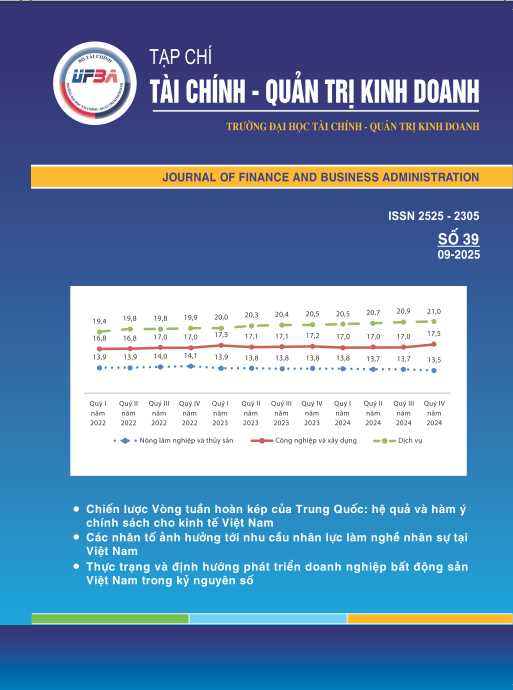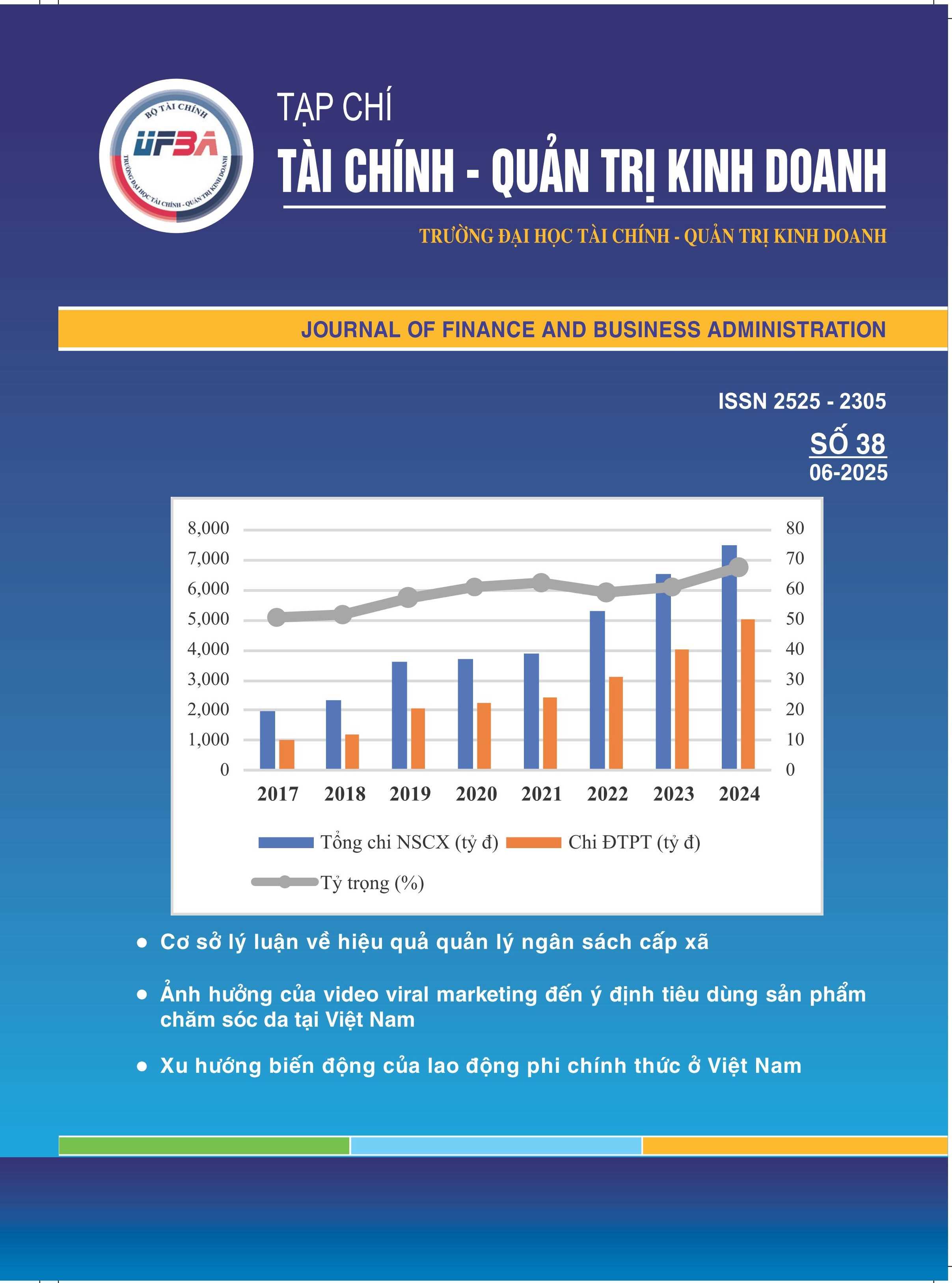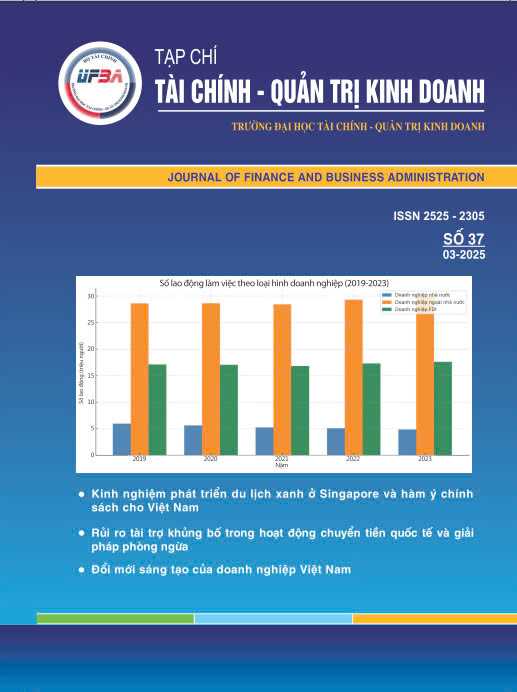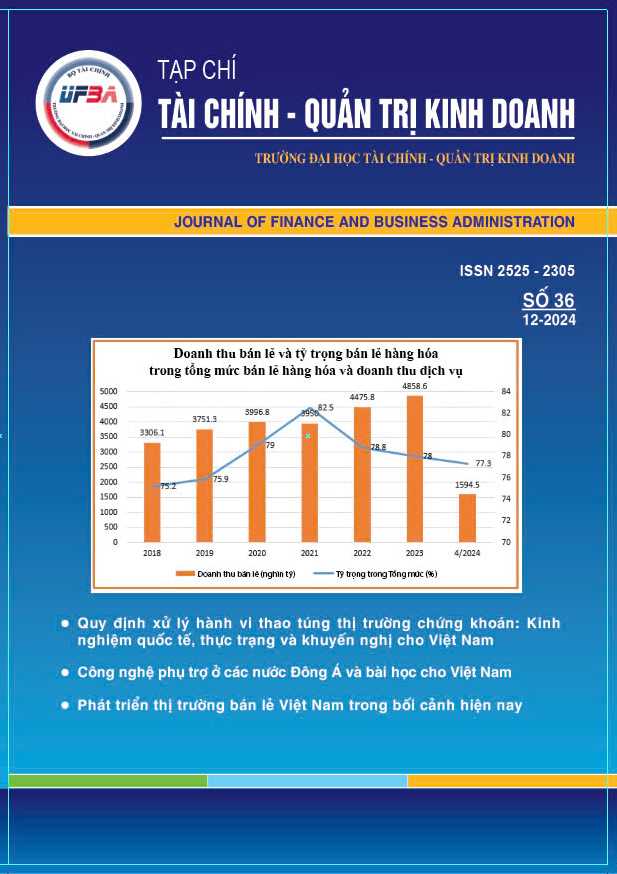JOURNAL OF FINANCE AND BUSINESS ADMINISTRATION, NUM 32.T12_2023
1. Analysis of the impact of debt structure affecting the profitability of real estate enterprises listed on Vietnam stock market
Nguyen Ngoc Quang, Mai Van Anh
Debt structure is an important financial indicator in an enterprise, not only assessing the solvency and liquidity of the enterprise, but also indicating whether the enterprise's debt usage is consistent with its characteristics and business environment. On the other hand, debt structure also affects the profitability of businesses. Businesses that use a lot of debt often have to pay high capital costs when facing an unfavorable business environment, which often reduces profitability and can lead to risks. liquidity or bankruptcy risk. On the contrary, businesses that use debt in accordance with the business environment and operating capacity are the driving force to promote growth in profitability. In this article, the authors conduct empirical research on the financial statements of 5 typical real estate businesses in all aspects to analyze debt structure, profitability and discover the relationship between debt structure. and profitability during the period from 2018-2022, with a volatile business environment. From there, the authors provide recommendations for businesses and authorities to have solutions to promote the development of the real estate market.
2. Factors affecting scientific research motivation of teachers of universities under The Ministry of Finance
Nguyen Thi Minh Tam, Hoang Thi Mau
At universities under the Ministry of Finance, besides teaching and serving the community, scientific research is an indispensable part in the development of academic systems, creating differentiation and efficiency, while helping the country participate in the global knowledge society. However, this activity is still not commensurate with the development orientation and policies of the schools. Through quantitative research method by surveying 220 teachers from 4 main universities under the Ministry of Finance (Academy of Finance, University of Finance and Marketing, University of Finance and Accounting and University of Finance - Business Administration), the article focuses on discovering and pointing out that there are 5 factors that affect the scientific research motivation of teachers at universities under the Ministry of Finance, which are personal factors. of teachers, procedures and funding, promotion opportunities, awareness of scientific research, and sense of responsibility. From there, the article proposes some management implications for managers at the above educational institutions.
3. Interactive marketing on digital platforms in e-commerce in Vietnam
Nguyen Thi Phuong Thuy, Bui Thi Minh Phuong,
Hoang Ha Phuong, Nguyen Thi Lan Huong
Businesses in the world in general and in Vietnam in particular have had incredible transformation in the 4th industrial revolution. That transformation is clearly demonstrated through the introduction of e-commerce into business activities to maximally meet customer needs and improve the competitiveness of businesses. To take advantage of the effectiveness brought by e-commerce, interactive marketing on digital platforms plays a very important role. Thanks to interactive marketing on digital platforms, businesses have helped overcome the Covid-19 pandemic and gradually developed business recovery and increasingly promoted e-commerce activities. Through this article, the author delves into the theoretical basis of e-commerce, interactive marketing and analyzes the current situation of interactive marketing applications on digital platforms in e-commerce in Vietnam, thereby proposing a solution. a number of solutions to promote further e-commerce development.
4. Soft skills training for students at university of finance and business administration
Ngo Thi An
Soft skills are a group of qualitative skills that reflect the individual's adaptation process to the living environment, working environment and job. Soft skills determine who you are? How does it work? How successful and productive are you at work? No matter where you are, what job you do. Today, the importance of Soft Skills has been placed first in an individual's career. Many employers want to work with a worker who has a strong work ethic and a desire to learn more than a skilled employee who is not motivated to try. Recognizing the importance of Soft Skills for students, the University of Finance and Business Administration has included a number of Soft Skills in the training program to teach students. The Soft Skills curriculum is implemented from the 2020-2021 school year to present. After a period of implementation, it was found that evaluating the teaching of Soft Skills for school students is necessary, contributing to improving the quality and effectiveness of teaching at the school.
5. Digital transformation and an application in Vietcombank
Tran Minh Hieu, Nguyen Phuong Linh, Nguyen Minh Duc
Digital transformation is one of the top concerns of businesses in the 4.0 industrial era, especially in the field of finance and banking. The application of digital technology in banks not only enhances the customer experience but also brings many practical benefits to the bank. In recent years, Vietnam's banking system has been continuously applying advanced technology in providing financial products and services, innovation to customers, which has also received special attention from the Party, Government and State Bank. Facing opportunities and challenges from digital transformation, Vietcombank also has specific action plans to gradually realize its plan to become a leading digital bank by 2025.
6. Sustainable development of the private economic
Vu Thi Thao, Trinh Thi Diep, Dinh Thi Luyen
In the process of innovation and development of Vietnam's socialist-oriented market economy, the private economy has made great contributions to the number of businesses and created jobs for the majority. labor, high annual profit margin, making an important contribution to the socio-economic development of Vietnam. Through this article, the author mentions the theoretical basis for the development of the private economy. The development of the private economy in the period 2017 - 2021, the proportion of the private economy compared to other economic sectors in Vietnam such as the state economic sector, collective economy, and invested economy abroad, through analysis to confirm the basis for the importance of the private economy. At the same time, the author points out the limitations of the private economy and offers solutions to promote rapid and sustainable development of the private economy in the coming time.
7. International experience in cooperative development and lessons for Vietnam
Le Tuan Hiep, Dao Thi Hong Xiem
Cooperatives have an important position and role in the socio-economic development of each country. Although the way of implementation may have differences depending on the actual conditions of each country, cooperatives are an economic sector that countries around the world are interested in, creating conditions to promote develop. The article provides an overview of the formation and development history of Cooperatives and focuses on analyzing experiences in Cooperative development in Canada, Japan, and Thailand. Thereby, lessons can be drawn for Vietnam in this field.
8. Tax management in the context of industry 4.0 at Hung Yen province Tax Department
Dao Van Tu, Soutpadaphone Vongpradith, Tingkham Vilayphon
Tax management in the context of the current Industrial Revolution 4.0 is one of the tasks of special concern to the tax industry. Tax management in the context of the 4.0 Industrial Revolution is carried out electronically, which will bring great benefits to people, society and tax authorities. However, tax management in the context of the 4.0 Industrial Revolution at the Tax Department of Hung Yen province is not yet highly effective. The article focuses on researching the current status of tax management in the 4.0 Industrial Revolution at the Tax Department of Hung Yen province. From there, propose some solutions to improve the efficiency of tax management at the Tax Department of Hung Yen province in the context of the current Industrial Revolution 4.0.
9. Vietnam e-commerce: oppotunity and challenge
Kim Thi Hanh, Pham Linh Chi
With the explosion of the Industrial Revolution 4.0, e-commerce is gradually globalizing, and the e-commerce market in Vietnam is going through a brilliant golden period, expanding and developing continuously. It is highly appreciated by many experts and organizations with significant potential and is expected to explode in the future. The e-commerce market in Vietnam contains many opportunities not only domestically but also in the international market. The transition of consumers from traditional shopping models to online shopping models creates a strong driving force for development. However, along with these opportunities, there are challenges that need to be considered and resolved to create a sustainable and safe e-commerce environment. herefore, the article focuses on analyzing the current situation of e-commerce in Vietnam to understand the opportunities and challenges. On that basis, the author offers some solutions for Vietnamese e-commerce to develop stronger in the coming time.
10. Assessing the impact of influence factors to the competitiveness of valuation enterprise in the current context
Tran Dinh Thang, Nguyen Minh Nhat
The article introduces the concept of competitiveness and influence factors to the competitiveness of valuation enterprise. In particular, influence factors to the competitiveness of valuation enterprise include the legal environment, economic environment, technological environment, strategic planning capacity of the business's board of directors, business ethics. Based on updating and analyzing the current status of influence factors, the authors express their opinions and assessments on the influence factors to make suggestions and recommendations for state management agencies, professional associations and valuation enterprise aim to help improve the competitiveness of valuation enterprise







